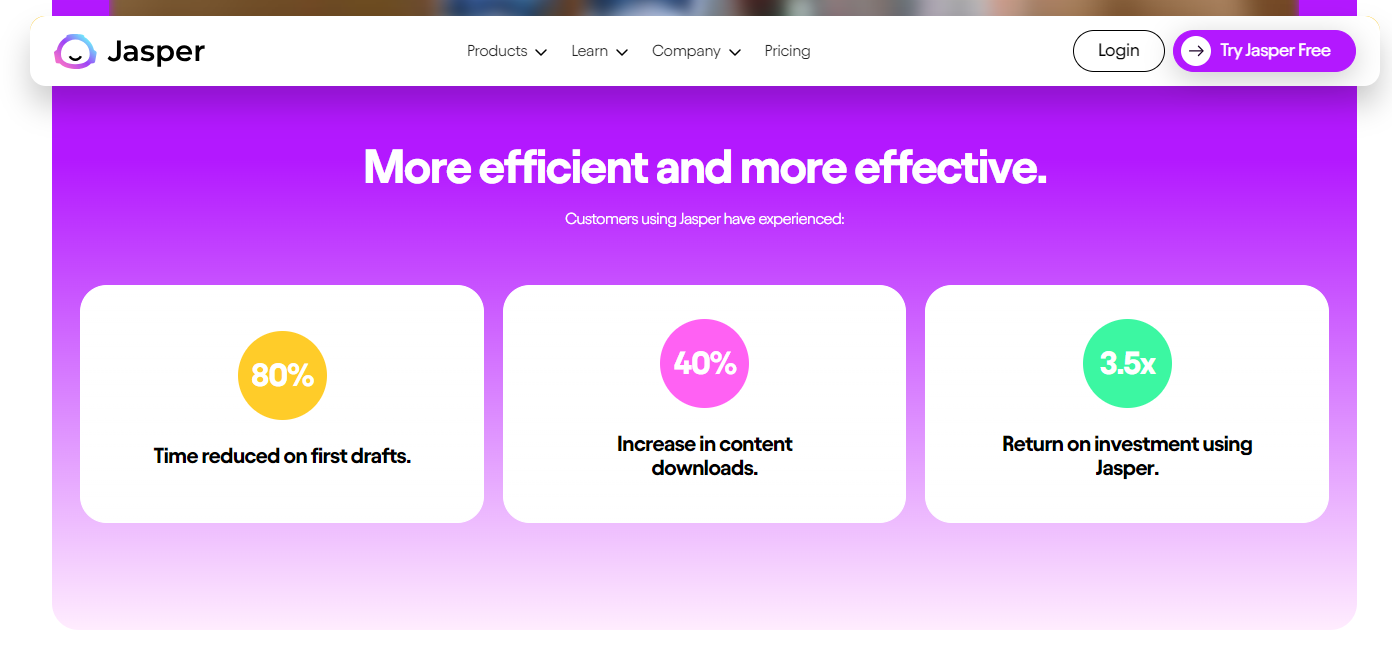AI technologies have evolved significantly through the years. AI's capacity to interpret, comprehend, and predict future behaviors has rippled across diverse sectors, notably affecting SEO.
In line with this, digital marketers should keep up with these trends to stay ahead of the competition.
This article explores the escalating significance of AI within the realm of SEO. We will also provide an array of AI-powered tools, equipping you with the means to leverage AI for the success of your website.
AI and SEO Explained
Artificial Intelligence combines vast datasets with principles of computer science to execute intricate tasks that surpass the capabilities of human intelligence.
SEO, or Search Engine Optimization, is about ranking organically below the paid search ads on a search engine rather than paying per click to be on the sponsored section of the results. SEO content matches with the target audience's search intent. Doing so not only boosts your website's visibility but also enhances its credibility, ultimately driving more traffic to your online platform.
How Has Artificial Intelligence Been Used in SEO?
Google introduced RankBrain into the search in 2015. It is the first AI that helps Google process and understand search queries and sort their results. With this, a creative and efficient content creation and optimization strategy is required to stay ahead of the competition.
AI's predictive capabilities are pivotal in recognizing emerging trends and patterns, enabling marketers to enhance the user experience. This proficiency aids in staying ahead of the curve in digital marketing, anticipating shifts in consumer behavior, and maintaining a competitive edge in the field.
The Role of AI in SEO for 2023 and Beyond
AI rapidly changed the SEO landscape. AI-powered tools automate manually done tasks. It continues to evolve and prove its effectiveness in automating SEO tasks and processes.
1. Streamline SEO Keyword Research Process
Traditional keyword research is an old-school approach to finding low-competition and high-search volume keywords. It is time-consuming — finding and plugging seed keywords, filtering opportunities, and evaluating competitiveness.
AI SEO tools can analyze vast amounts of data to identify keywords of a particular topic or industry and predict which keywords lead to conversions.
2. Improved Link Building
A building strategy involves acquiring hyperlinks from other websites to yours. A website with numerous high-quality links pointing to it is seen as more authoritative and tends to rank higher on SERPs.
AI can help find relevant websites to acquire links from by using NLP. Most notably, ChatGPT can also help make personalized outreach campaigns for link prospects.
Lastly, AI can identify low-quality or spammy backlinks that could harm SEO efforts. Ai-driven algorithms monitor and analyze backlinks performance to make an informed decision and have better link-building strategies.
3. AI-Driven Content Creation
By leveraging AI, businesses can gain deeper insights into user intent, which allows content generated by AI to be extensive and fine-tuned for SEO optimization. AI can craft content that resonates precisely with users' requirements, preferences, and interests.
When visitors find content that aligns perfectly with their needs, they are likelier to stay longer, explore further, and interact with the website. Consequently, this increased engagement contributes to higher visibility in search engine results, ultimately boosting SEO performance.
4. On-Page SEO
On-page SEO optimizes individual pages to rank higher and earn more relevant traffic. Its traditional practices include optimizing meta tags and URL structures and incorporating high-volume keywords in the content.
With the integration of AI for on-page SEO, it can assess the readability and relevance of content, suggest accurate keywords, optimize meta descriptions, and even predict how changes in these elements might affect search rankings. AI tools, equipped with machine learning capabilities, analyze data across thousands of websites to understand ranking factors better and adjust on-page SEO elements effectively.
5. Enhanced User Experience (UX)
AI and UX have a foundation of predictive analysis and the goal to interpret human behaviors and foresee what a person will do next.
Based on a user's browsing history, preferences, and behavior, AI can predict and display content most relevant to a user. Amazon and Netflix use this strategy extensively to provide tailored recommendations for a personalized UX that boosts user engagement and satisfaction.
6. AI and Voice Search Optimization
In Search Engine Optimization, the resonance of voice-activated digital companions has undeniably surged. In 2023, there will be 8 billion AI-powered voice assistants.
Enhancing user convenience is paramount through facilitating web searches via voice commands in situations where the act of typing is inconvenient or impossible.
Artificial Intelligence can better understand websites in order to enhance understanding and analysis of natural language. This is important for voice search requests as they often involve longer, more conversational sentences than typed queries.
7. Streamline Technical SEO Processes
AI significantly makes the technical SEO process more efficient and manageable. AI SEO tools can automate identifying and fixing broken links, eliminating the need for manual checks. It optimizes sitemaps, ensuring search engine bots index the website's pages.
AI can audit websites for potential technical SEO issues in meta descriptions, URL structures, and mobile friendliness.
8. Competitor Analysis
Understanding what your competitors are doing right and identifying their weaknesses allows businesses to tailor their SEO strategies to surpass the competition. Competitor analysis provides insights into the keywords your competitors rank for, their backlink sources, and their on-page SEO tactics.
With the advent of Artificial Intelligence, conducting effective and thorough competitor analysis has become more straightforward and precise. AI-powered tools scan and analyze competitor websites at an unprecedented scale and speed. These tools also identify gaps in your SEO strategy by benchmarking your website against your competitors.
Potential Challenges and Implications in the Use of AI in SEO
Despite the vast opportunities of AI for SEO, there are potential challenges and implications in using it.
Biases
AI algorithms are only as effective and accurate as the data they're based on. It learns from the existing data and makes decisions based on patterns and correlations.
Biases may come from flawed algorithms and improper implementation. If the training data contains bias, AI may perpetuate and amplify those biases when making decisions.
Training Data
AI models depend on the richness, accuracy and relevance of training data from which they draw their knowledge. If this data is incomplete, inaccurate or outdated, it can lead to false predictions and decisions when applied to SEO campaigns.
Another issue is training AI with AI-generated content. Over time the accuracy of the output can vary significantly and become dangerous if facts are not checked..
Complexity
Building AI models for SEO can be complex and require many resources. Companies should invest strategically in talent and technological infrastructure to fully capitalize on the potential of AI in SEO. The convergence of expertise and computational power constitutes the infrastructure upon which AI-enabled SEO strategies thrive.
Cost
AI-enabled SEO represents a substantial financial commitment for companies, encompassing hardware, software, and personnel investments. Factors contributing to the cost are the following:
- Hardware and software investments
- Personnel costs
- Data costs
- Training and skill development
Lack of Explainability
Most AI models are black boxes, meaning their decisions cannot be fully understood or explained. Consequently, it can sometimes be challenging for businesses to explain the underlying reasons behind specific determinations and pinpoint the individuals accountable if remedial action becomes necessary.
Best AI SEO Tools in 2023
SEO is in flux due to technological advancements. But with AI SEO tools, you can improve the efficiency and effectiveness of SEO tasks and processes.
AI SEO tools are software programs that analyze a website's performance and provide solutions to improvement areas. These tools improve organic performance by providing SERP analysis, spotting trending topics and suggesting relevant keywords.
In 2023, some of the top AI SEO tools individuals and businesses use are Jasper AI, Surfer SEO, Byword, SEO.ai, Perplexity AI, and ChatGPT.
Jasper AI

According to Unite.AI, Jasper AI is one of the top 10 AI SEO tools in October 2023. It helps in optimizing business websites for better organic results.
Jasper AI improves website traffic with high-quality, targeted content using natural language processing (NLP). It offers tools, including AI writing and AI marketing software, designed to generate SEO-optimized content. These tools can create various materials, such as posts, emails, and marketing content, from over 50 templates, all equipped with helpful features to enhance your content marketing efforts.
What makes Jasper AI stand out is its specific application in creating Meta Descriptions and Title Tags – two essential elements of SEO. Using the user's target keywords, Jasper AI can generate compelling meta descriptions and title tags, often resulting in improved click-through rates from search engine results pages.
Surfer SEO

Surfer SEO optimizes your On-Page SEO using natural language processing (NLP). It offers in-depth insights into high-ranking pages' content structure, length, and keyword usage.
Surfer SEO analyzes competitors' keywords and content, runs it through NLP, and then suggests the frequency of the keyword usage in your content. It also gives several words, headings, paragraphs, and images to use. Following these metrics, Surfer SEO promises a boost in ranking in SERPs.
Surfer SEO ideally integrates with WordPress and CMS platforms, making it easy to write SEO-optimized content. Its key features are a blog post generator, plagiarism checker, content editor, and AI outline generator.
Byword

Byword focuses on delivering large volumes of high-quality, SEO-optimized articles in a custom writing voice of your brand. It can generate content on any topic in multiple languages within a few clicks.
Byword seamlessly integrates with WordPress, Blogger, and Tumblr, making publishing optimized SEO content a breeze. It goes beyond by offering automated image creation and social media post generation to effortlessly enhance the website's online presence across various platforms.
SEO.ai

SEO.ai allows seamless implementation of SEO strategies for organic search visibility and ranking improvement. It speeds up the creation and optimization with tools to help find and evaluate relevant keywords.
SEO.ai can generate an entire post with a customized tone of voice, target audience, and language for a project. It provides keyword research insights and suggests titles and headlines for your posts to write optimized content faster.
Perplexity AI

Perplexity AI is similar to ChatGPT in an interactive approach but has a citation feature for fact-checking purposes. It helps you determine the accuracy of the information, as it gives the sources of the provided information - a good reference. Like any other AI SEO tool, Perplexity AI can generate content, do keyword research and more.
Generative AI (ChatGPT)
Generative AI, like ChatGPT, falls under the broader category of machine learning. It uses algorithms to change how various tasks are performed.
Generative AI can create high-quality, SEO-optimised content at scale, reducing the manual effort involved in content creation. It accesses and organizes large amounts of data quickly. ChatGPT can be used as an AI SEO tool for keyword research, content generation, summarization and optimization.
Conclusion: Will AI Completely Change SEO?
AI has already changed the SEO landscape and can undeniably revolutionize it further. As businesses continuously adopt AI-driven tools for their SEO strategies, they gain a competitive edge in the digital landscape.
The influence of AI on the SEO realm extends deeply and extensively. Its offering unveils extraordinary prospects for automating functions, tailoring user interactions, and executing website audits. However, it simultaneously brings out complications, like potential biases, complexity, and high costs.
Within emerging technologies, the essence lies in skillfully exploiting its possibilities while mitigating its inherent shortcomings. AI will not completely replace human input in SEO; it will augment human capabilities, allowing for more strategic and effective SEO practices.


.jpg)
.jpeg)


.jpeg)
.jpg)
.jpg)


%2520(1).jpeg)

.jpeg)




.jpeg)






%20(1).png)
.png)
